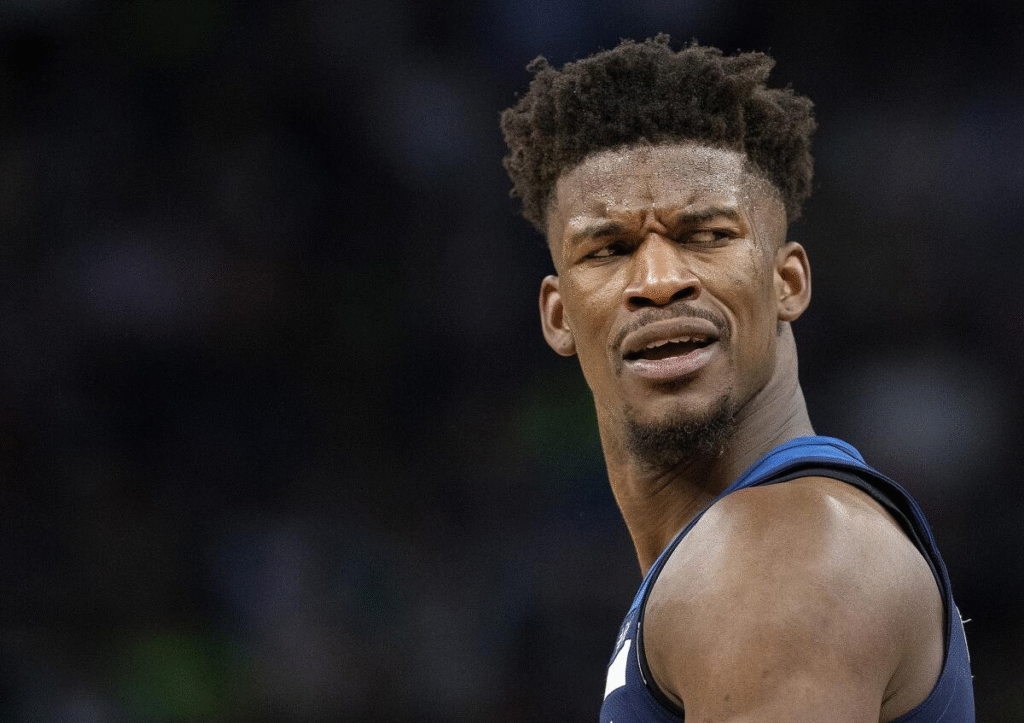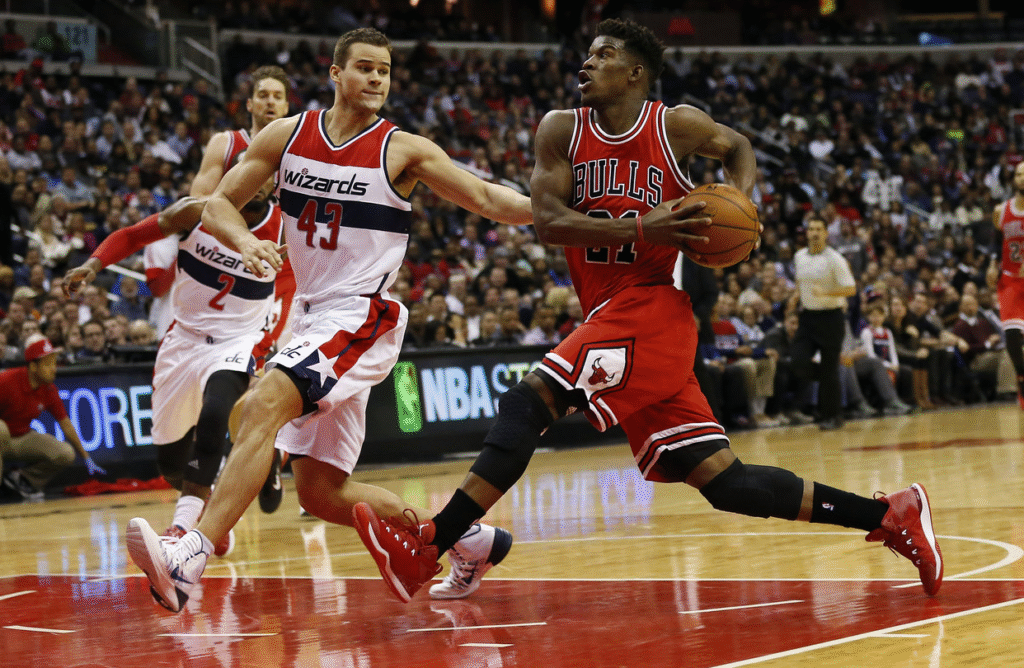Jimmy Butler, the Golden State Warriors’ star forward, suffered a pelvic contusion during Game 2 of the first-round NBA Playoff series against the Houston Rockets.
The injury occurred in the first quarter when Butler was undercut mid-air by Rockets guard Amen Thompson while attempting a rebound.
Despite briefly remaining in the game to make two free throws, Butler left with 1:51 remaining in the quarter and will undergo an MRI on Thursday to assess the severity.
This injury comes at a crucial time for the Warriors, who had secured a 95–85 victory in Game 1, with Butler contributing 25 points, seven rebounds, six assists, and five steals.
His absence in Game 2 was felt as the Warriors fell 109-94 to the Rockets, leaving the series tied at 1-1.
What Lies Ahead
If the MRI reveals a severe injury, the Warriors may be forced to rethink their strategy in the 2025 playoffs. While Curry and Thompson are capable of magical performances, the absence of Butler would leave a gaping hole on both ends of the floor. However, if the injury proves to be minor, Butler will undoubtedly return with the same ferocity that has defined his career.
Regardless of what happens next, Jimmy Butler has already etched his name in the history books. He’s a fighter, a leader, a survivor, and above all, a Warrior in every sense of the word.

Jimmy Butler vs. Other NBA Greats
Jimmy Butler doesn’t boast the same statistical dominance as players like LeBron James or Giannis Antetokounmpo. He doesn’t light up the scoreboard like Stephen Curry or rack up assists like Chris Paul.
However, when it comes to intangible qualities—leadership, mental toughness, and the ability to galvanize a team—he’s in a league of his own.
Consider this: in the 2020 NBA Finals, Butler, with an injury-depleted Miami Heat squad, nearly dethroned a fully-loaded Los Angeles Lakers team.
His triple-double performances, where he outplayed both LeBron James and Anthony Davis in crunch time, weren’t just incredible—they were legendary. Few players have been able to carry a team on their shoulders under such pressure. Butler did it with class, composure, and, most importantly, belief.
Compared to someone like Kawhi Leonard—who also thrives under pressure—Butler brings a louder, more vocal leadership style. Where Kawhi leads quietly by example, Butler is vocal in the locker room, challenging teammates to rise with him.
His leadership style is more comparable to Draymond Green, but with the offensive versatility to take over games.
Legacy and Reputation
Jimmy Butler is a polarizing figure. Some fans and analysts view him as difficult, especially considering his departures from Minnesota, Philadelphia, and Miami.
But others see him as a perfectionist unwilling to compromise his values. He demands excellence from himself and those around him—an attitude that often ruffles feathers but also inspires greatness.
In many ways, Butler is the embodiment of the modern underdog superstar. He didn’t grow up with privilege, didn’t benefit from early celebrity, and didn’t receive special treatment. Every accolade he owns, from his All-Star selections to his Finals appearances, was earned through grind and sacrifice.
Butler’s teammates often rave about his loyalty and heart. He builds strong bonds with those who match his energy and commitment. While not always the easiest person to play with, he’s one of the best to go to war with on the court.
Early Life and Rise to Prominence
Born on September 14, 1989, in Houston, Texas, Jimmy Butler III faced significant challenges early in life. His father abandoned the family when Butler was an infant, and at 13, his mother kicked him out of the house.
He moved between the homes of various friends, staying for a few weeks at a time before moving to another house. Despite these hardships, Butler maintained a relationship with his parents, stating, “I don’t hold grudges. I still talk to my family. My mom. My father. We love each other. That’s never going to change.”
Butler’s basketball journey began at Tyler Junior College before transferring to Marquette University. He was selected with the 30th overall pick in the 2011 NBA draft by the Chicago Bulls. In 2015, he was named the NBA Most Improved Player.
After six seasons in Chicago, he was traded to the Minnesota Timberwolves in June 2017, and was then again traded in November 2018, this time to the Philadelphia 76ers. In July 2019, he signed with the Miami Heat.
During his first season with the team, Butler reached the NBA Finals. In 2021, he led the league in steals. In 2023, Butler and the eighth-seeded Heat played in the 2023 NBA Finals, their second appearance in four years. Amidst conflicts with the Heat’s front office, Butler was traded to the Warriors in 2025.

Golden State Warriors Era
On February 6, 2025, Butler was traded to the Golden State Warriors in a five-team deal that sent a package headed by Andrew Wiggins to the Heat.
He declined his player option for the 2025–26 season to sign a two-year, $121 million contract extension with the Warriors, which will end after the 2026–27 season. He chose to wear “Butler III” on his jersey during his Warriors tenure to honor his late father.
Butler made an immediate impact with the Warriors, debuting with 25 points in a 132–111 win over the Chicago Bulls. On March 10, he recorded his first triple-double with the Warriors, with 15 points, 10 rebounds, and 10 assists.
In the play-in tournament, Butler scored a game-high 38 points to secure the seventh seed for the playoffs. In Game 1 of the playoff series against the Rockets, he contributed 25 points, seven rebounds, six assists, and five steals in a 95–85 victory.
Off the Court: Business Ventures and Personal Life
Beyond basketball, Butler is an entrepreneur. During the NBA Bubble, he started Bigface Coffee, selling coffee to other players.
He officially launched Bigface as a coffee company and lifestyle brand in 2021, selling direct-to-consumer coffee, apparel, and related merchandise. Bigface has plans to open cafés in Miami and San Diego, where Butler lives during NBA offseasons.
Butler is also known for his love of country and emo music. He starred in the music video of the country song “Light It Up” by Luke Bryan and the emo song “So Much (for) Stardust” by Fall Out Boy. He is featured in the Netflix documentary series, Starting 5, which followed Butler, Anthony Edwards, LeBron James, Domantas Sabonis, and Jayson Tatum through the 2023-24 NBA season and playoffs.
In his personal life, Butler and his former girlfriend have three children. He did not make his Heat debut until the fourth game of the 2019-20 NBA season, as he was on paternity leave after the birth of his first child.
Butler’s father died on February 8, 2024. He is a Christian and is good friends with Mark Wahlberg. He became a fan of soccer during the 2016 Summer Olympics, after watching Neymar Jr. play for Brazil. He has rooted for Paris Saint Germain and said his favorite player is Neymar.
Wealth and Business Acumen
Financially, Jimmy Butler is thriving. His latest contract with the Golden State Warriors, worth $121 million over two years, reflects his value to any organization. But his ambition doesn’t stop with basketball.
Bigface Coffee, the company he founded during the 2020 NBA Bubble, has evolved into a robust lifestyle brand. What started as a $20-a-cup coffee stand has turned into a multi-million-dollar venture, complete with a growing online presence, merchandise lines, and plans for physical coffee shops.
Butler has smartly diversified his income streams, investing in a brand that represents hustle, quality, and uniqueness—much like the man himself.
He has also become an emerging face in entertainment. His appearances in music videos and documentaries show a keen understanding of branding and visibility.
Unlike many athletes who fade from the spotlight after retirement, Butler seems poised to transition into a post-NBA career with ease, whether it be in entrepreneurship, media, or even coaching.
Relationship with the Warriors
Jimmy Butler’s connection with the Golden State Warriors is one of mutual benefit. The franchise needed fresh energy, a new face with championship-level hunger. Butler brought that and more.
While the Warriors historically thrived on ball-sharing and light-hearted chemistry, Butler’s grittier presence introduced a new type of fire.
He also mentored young talents within the organization, from Jonathan Kuminga to Moses Moody. His leadership, particularly in the locker room, has filled a void left by the aging core of Curry, Thompson, and Green.
Whether or not this tenure results in a championship, Butler’s influence will be felt for years in the Warriors’ culture.

Wish
Jimmy Butler’s story is more than just an NBA success; it’s a narrative of survival, grit, and unapologetic authenticity. From being homeless as a teenager to becoming one of the league’s fiercest competitors, Butler’s journey embodies what it means to be resilient.
He didn’t follow the typical blueprint of a superstar—no five-star recruit badge, no high-profile college team dominating national headlines. Instead, he carved his own path, one game, one hustle play at a time.
His recent transition to the Golden State Warriors marked yet another chapter in his ever-evolving career. While it was initially surprising—given the franchise’s historically flashy, ball-movement-heavy style—Butler adapted quickly.
His grit and defensive tenacity injected new life into the Warriors’ aging roster. Even in a system built around Steph Curry’s finesse and Klay Thompson’s shooting, Butler stood out with his raw determination and unselfish play.
Yet, his injury during Game 2 of the 2025 playoffs—a pelvic contusion—raises concerns. The Warriors have leaned heavily on Butler during high-pressure moments, and his presence has been vital in steering the team through tough matchups.
As he undergoes an MRI and the team waits for results, both fans and analysts alike are left to wonder how the Warriors will fare without their emotionally driven leader.
Read More : The Story Behind the Golden State Warriors’ First Jersey
